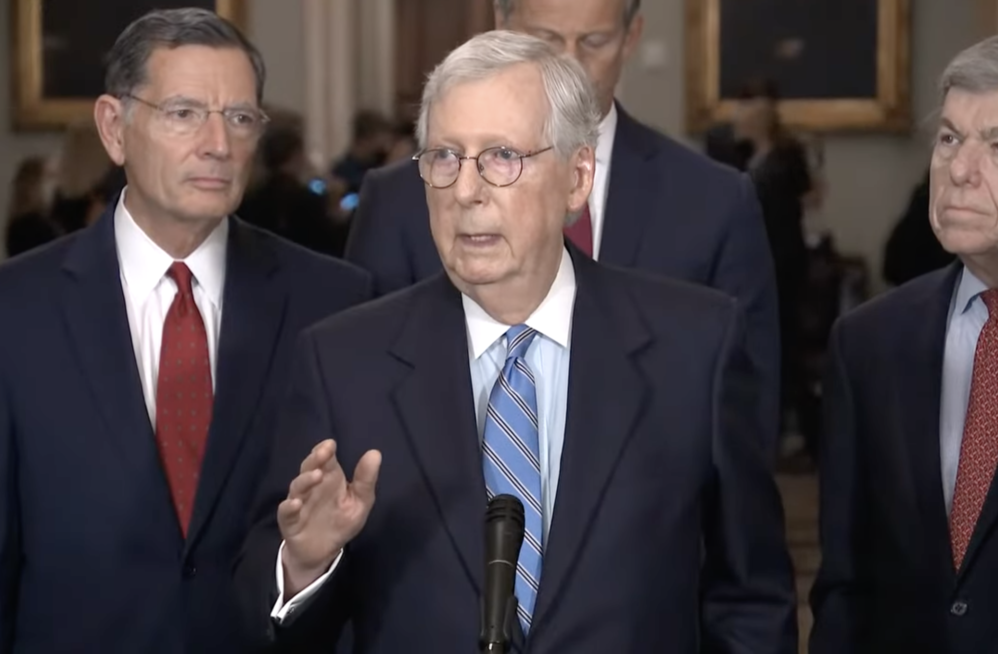Republicans caving on the debt ceiling paved the way for Democrats to focus the rest of the fall on their tax-and-spending spree.
In July, Senate Minority Leader Mitch McConnell, R-Ky., pledged “a hell of a fight” to stop Democrats’ $3.5 trillion spending blowout, which “is not going to be done on a bipartisan basis.” That “fight” lasted for less than three months.
On Wednesday, McConnell began negotiating an agreement with Minority Leader Chuck Schumer, D-N.Y., to raise the debt limit until some point in December. McConnell’s offer also attempted to force Democrats to use the budget reconciliation process to pass a longer-term debt limit increase, but Democrats quickly rejected that element of his proposal out of hand.
As part of this agreement, McConnell got Democrats to vote to increase the debt limit by a specific amount (i.e., authorize so many billions or trillions in new borrowing), rather than suspend it to a certain time (i.e., suspend the debt limit until December 16, 2022, as Democrats originally proposed). Some may consider this a meaningful concession, one that more readily allows for political attack ads, but in reality, anyone who votes to suspend the debt limit votes for all the debt incurred during that period of time regardless.
In exchange, McConnell 1) got no policy concessions at all; 2) gave Democrats the time and space to ram through their massive spending bill; and 3) created the reasonable expectation that Republicans will cave on the debt limit a second time when it comes up in December. (Congressional leaders will probably try to cram that debt limit increase into an omnibus spending bill totaling thousands of pages.)
Just as important, McConnell violated the letter that he and 45 other Senate Republicans signed on August 10, when they said that “We will not vote to increase the debt ceiling, whether that increase comes through a stand-alone bill, a continuing resolution, or any other vehicle.” McConnell and several of his colleagues will now have to vote to help the Democrats pass a debt limit increase, which they said two months ago they would not do.
This isn’t savvy legislating; it’s an all-out surrender, and one the Biden administration was publicly banking on all along. Generally, when both Democrats and Republicans think you caved — one GOP senator said “you could hear a pin drop” when McConnell explained his debt limit offer to his Republican colleagues — that’s exactly what you did.
Republicans Had Leverage…
It’s worth dispensing with the main McConnell talking point about the debt limit: that Democrats had all the votes they needed to raise the debt limit unilaterally. That was true at first, but Democrats surrendered that advantage more than six weeks ago when the House formally adopted Senate Democrats’ budget resolution on August 24.
Once the House and Senate agreed to a concurrent budget resolution — one that did not provide for a debt limit increase via budget reconciliation — they gave control of the issue to Republicans. For the uninitiated, the reconciliation process, which has strict parameters, allows the Senate to pass fiscal matters with a simple majority of 51 votes (in this case, 50 Democrats plus Vice President Kamala Harris), rather than the 60 votes normally needed to break a filibuster.
Guidance issued by the Senate parliamentarian earlier this spring permitted Democrats to revise that budget, to allow for a debt limit increase to pass on a party-line basis via reconciliation. But amending the budget first requires a vote in committee — and that committee process requires Republican cooperation.Read the rest from Christopher Jacobs HERE
If you like what you see, please "Like" us on Facebook either here or here. Please follow us on Twitter here.



No comments:
Post a Comment